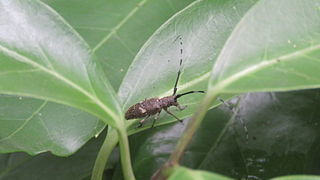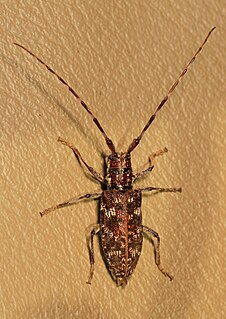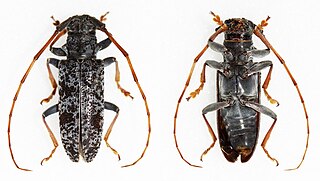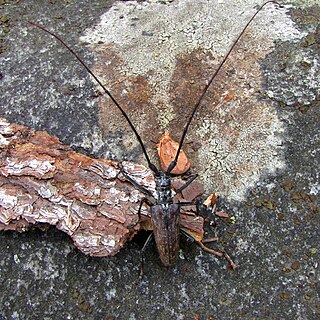
Monochamus is a genus of longhorn beetles found throughout the world. They are commonly known as sawyer beetles or sawyers, as their larvae bore into dead or dying trees, especially conifers such as pines. They are the type genus of the Monochamini, a tribe in the huge long-horned beetle subfamily Lamiinae, but typically included in the Lamiini today.

Monochamus scutellatus, commonly known as the white-spotted sawyer or spruce sawyer or spruce bug, is a common wood-boring beetle found throughout North America. It is a species native to North America.

Monochamus dubius is a species of beetle in the family Cerambycidae. It was described by Charles Joseph Gahan in 1894. It is known from India, Thailand, Myanmar, Vietnam, Taiwan, and China.
Monochamus farinosus is a species of beetle in the family Cerambycidae. It was described by Henry Walter Bates in 1884, originally under the genus Melanopolia. It is known from Gabon.

Monochamus subfasciatus is a species of beetle in the family Cerambycidae. It was described by Henry Walter Bates in 1873. It is recorded from Japan where it infests Japanese red pine and is a vector of the nematode Bursaphelenchus doui.
Monochamus adamitus is a species of beetle in the family Cerambycidae. It was described by James Thomson in 1857. It is known from Tanzania, Sierra Leone, Angola, Ghana, Mozambique, the Ivory Coast, Senegal, the Democratic Republic of the Congo, Malawi, and Zimbabwe.

Monochamus sutor is a species of beetle in the family Cerambycidae. It was described by Carl Linnaeus in 1758, originally under the genus Cerambyx. It has a wide, natural distribution throughout Europe, and has also been introduced into Belgium and the Netherlands. Adults measure between 15 to 24 mm, and larvae measure up to 45 mm (1.8 in).

Monochamus alternatus, the Japanese pine sawyer, is a species of beetle in the family Cerambycidae. It was described by Frederick William Hope in 1842. It is known from Hong Kong, Vietnam, Laos, North Korea, South Korea, Japan, China, and Taiwan. It feeds on Pinus banksiana, Abies firma, Pinus armandii, Pinus massoniana, and Pinus densiflora. It serves as a vector for the nematode Bursaphelenchus xylophilus.

The spotted pine sawyer is a species of beetle in the family Cerambycidae. It was described by John Lawrence LeConte in 1852.

Monochamus galloprovincialis, the pine sawyer beetle, also referred to as the black pine sawyer beetle, is a species of beetle in the family Cerambycidae. It was described by Olivier in 1795, originally under the genus Cerambyx. It has a wide distribution, occurring naturally throughout Europe and the Caucasus. It has also been introduced into the Canary Islands. It serves as a vector for the parasitic nematode species Bursaphelenchus xylophilus, and also acts as a host to the parasitoid wasp species Dolichomitus tuberculatus.

Monochamus irrorator is a species of beetle in the family Cerambycidae. It was described by Chevrolat in 1855, originally apelled as "Monohammus" irrorator. It is known from the Republic of the Congo and Nigeria.
Monochamus leuconotus is a species of beetle in the family Cerambycidae. It was described by Francis Polkinghorne Pascoe in 1869, originally under the genus Anthores. It is known from Tanzania, Cameroon, Malawi, Kenya, Mozambique, Namibia, South Africa, Uganda, the Democratic Republic of the Congo, Zambia, Angola, and Zimbabwe. It feeds on Coffea arabica.

Monochamus mutator, the spotted pine sawyer, is a species of beetle in the family Cerambycidae. It was described by John Lawrence LeConte in 1850. It is known from Canada and the United States.

Monochamus notatus, the northeastern pine sawyer or notable sawyer, is a species of beetle in the family Cerambycidae. It was described by Dru Drury in 1773, originally under the genus Cerambyx. It is known from Canada and the United States.

Monochamus obtusus is a species of beetle in the family Cerambycidae. It was described by Casey in 1891.
Monochamus ruspator is a species of beetle in the family Cerambycidae. It was described by Johan Christian Fabricius in 1781, originally under the genus Lamia. It has a wide distribution throughout Africa.

Monochamus sartor is a species of beetle in the family Cerambycidae. It was described by Johan Christian Fabricius in 1787, originally under the genus Lamia. It is known from throughout Europe, as well as in Kazakhstan, Mongolia, North Korea and South Korea. It is rated by the IUCN as Least Concern.
Monochamus stuhlmanni is a species of beetle in the family Cerambycidae. It was described by Kolbe in 1894. It is known from Rwanda, the Democratic Republic of the Congo, and Uganda.

Monochamus spectabilis is a species of beetle in the family Cerambycidae. It was described by Perroud in 1855, originally under the genus Lophoptera. It has a wide distribution throughout Africa. It contains the varietas Monochamus spectabilis var. immaculipennis.
Monochamus thomsoni is a species of beetle in the family Cerambycidae. It was described by Chevrolat in 1855, originally under the genus Monohammus. It has a wide distribution throughout Africa. It contains the varietas Monochamus thomsoni var. buea.













